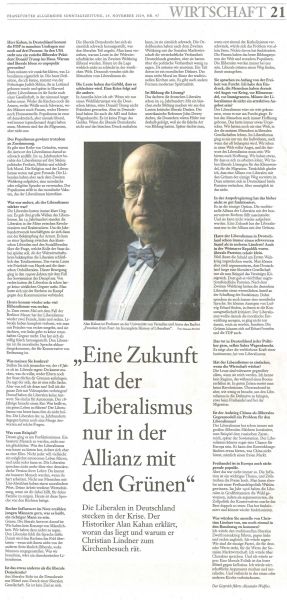Alan Kahan Defines Liberalism
This article "Eine Zukunft hat der Liberalismus nur in der Allianz mit den Grünen" (Liberalism can only achieve its goals in an alliance with the Green Party) appeared in the Frankfurter Allgemeine newspaper in November. The text of the article consists of an interview with an American historian named Alan Kahan who lives and works mostly in France. His book Freedom from Fear appeared in 2023, with the undertitle: An Incomplete History of Liberalism.
In its first question, the newspaper editor asks, "Why have the defining ideas of Liberalism become so unpopular?"
Kahan replied:
"First, you need to define Liberalism. The best definition comes from the political scientist Judith
Shklar, who taught at Harvard (1928-1992). She said Liberalism strives to create a society that is
free from fear. Neither the rich, nor the poor, Black nor White, man nor woman, and neither a
Homo- nor a Heterosexual should feel fear. Populism may wear a democratic facade, but it is
never liberal, because it causes fear, especially amongst immigrants."
This quote basically paraphrases the opening lines from Kahan's book Freedom from Fear, which he describes as an "incomplete" history of Liberalism. Interesting that freedom from fear serves as Kahan's lead-in to defining it. Most liberals would disagree with his definition. He should give it a more pro-active starting-point, as well as definitive terms of reference.
The editors at the Frankfurter Allgemeine also question Kahan's definition. They ask him questions like "Can you be more concrete?" and "Give us an example." If he addresses his thesis only to true-believers, they will accept his pie-in-the-sky presumptions without thinking too much about them. Everyone else wants something more concretely definitive.
Never once during the interview does Kahan mention John Locke (1632-1704), to whom Wikipedia attributes the origin of the term "Liberalism". Wikipedia says that Locke created the foundation of a liberal society: "Each man has a natural right to life, liberty, and property, and that government must not violate these rights."
Locke's use of "Liberal" is not proprietary, unfortunately. The Left probably co-opted "Liberalism" during the French Revolution, a hundred and eighty years later. Wikipedia writes that the radical groups who supported the Revolution, the Montagnards and the Jacobins, sat on the left side of the Assembly, but I am not sure that they gave Liberalism its leftist interpretation.
The Swiss political party Les Radicaux Liberal, for instance, understood Liberalism by the meaning Locke gave it. Odd to think that the Swiss Party understood Liberalism as a challenge to European monarchy; so they termed their party Radical! Like Locke, Les Radicaux Liberal defied intervention by the government and defined itself as freedom-loving and based on individual initiative.
Wikipedia describes the Left as a "range of political ideologies that support social equality . . . often in opposition to social hierachy." But since pursuing social equality and opposing social hierarchy involves intervention by the government, to equalize things, Kahan should judge its intervention as illiberal.
We must accept that competing social forces endure opposition and conflict with one another, as in any free society. The suggestion that those forces can live together without fear is, at best, wishful thinking. The effort to live without fear causes people to organize. The concentrations of power that result occur in any society.
If you say that human freedom depends on providing a defense against arbitrary decisions made by men, then a body of laws has to provide that defense—"a nation of laws and not of men", as John Adams (1732-1826), America's first "Radical Liberal", wrote in 1774 in the Boston Gazette, then again in the Massachusetts Constitution, 1780). In 1787, after hostilities with Great Britain ended, he and the other Founders organized those laws into the U.S. Constitution.
As much as any nation can lessen fear, America has succeeded as a liberal society, judging by the endless stream of humanity trying to gain entry here.

